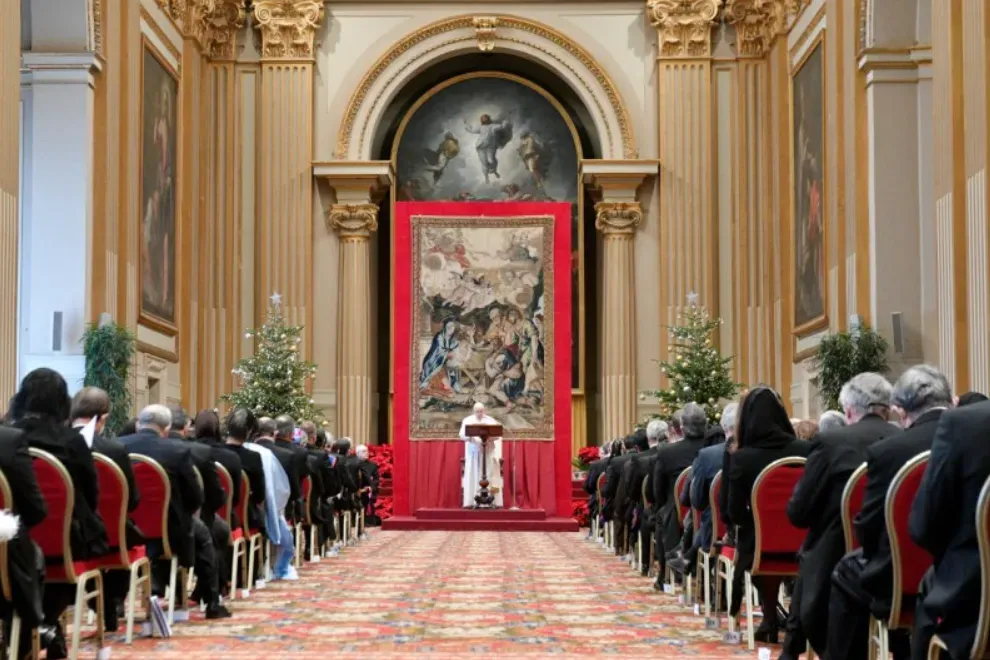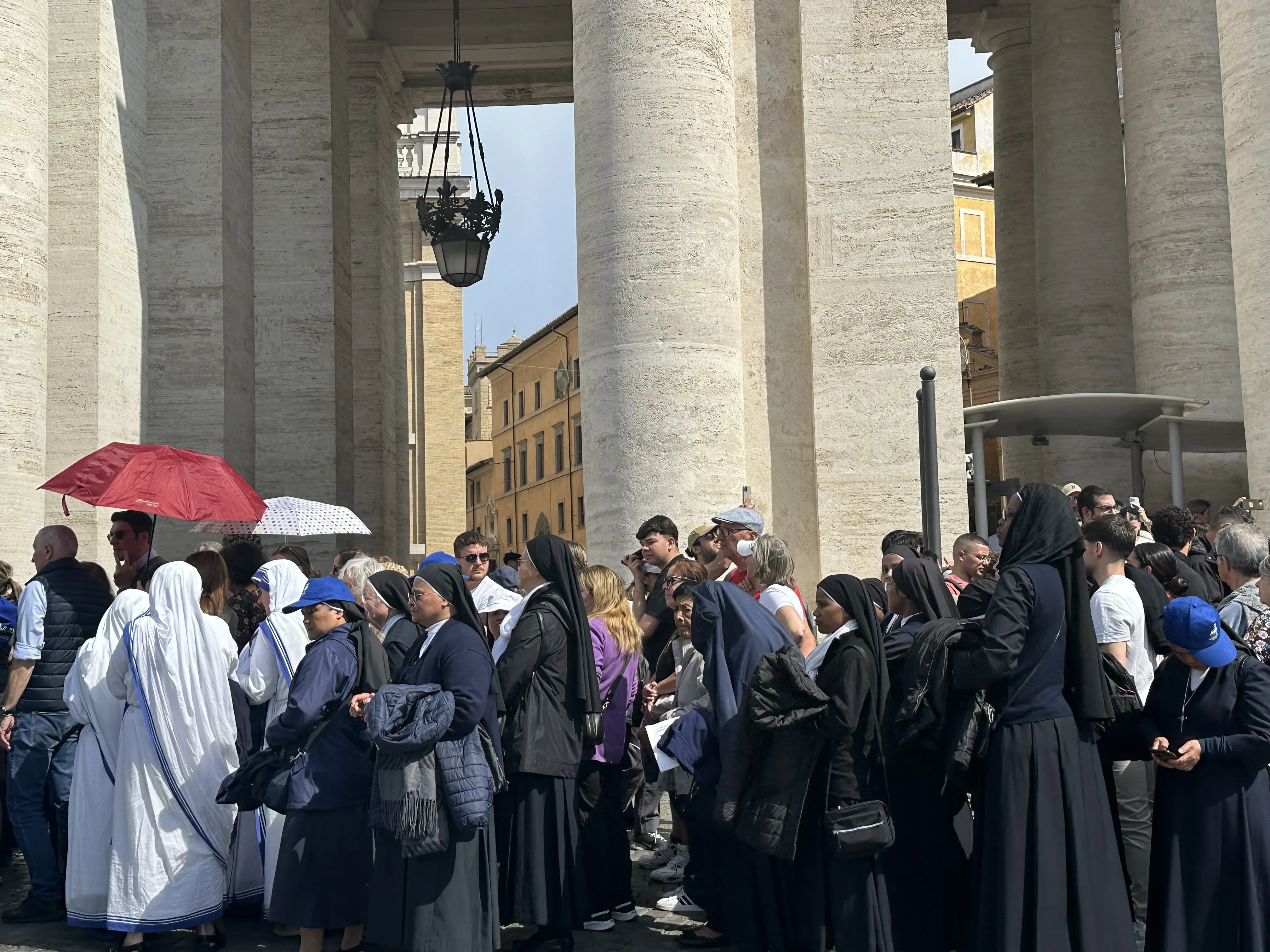“Thank you, Holy Father, for your untiring work, which is a source of hope for many peoples, for many men and women,” he said.
Speaking beneath a large tapestry depicting the nativity of Christ, the pope strongly endorsed COVID-19 vaccination campaigns.
“Sadly, we are finding increasingly that we live in a world of strong ideological divides,” he said. “Frequently people let themselves be influenced by the ideology of the moment, often bolstered by baseless information or poorly documented facts.”
“Every ideological statement severs the bond of human reason with the objective reality of things. The pandemic, on the other hand, urges us to adopt a sort of ‘reality therapy’ that makes us confront the problem head-on and adopt suitable remedies to resolve it.”
“Vaccines are not a magical means of healing, yet surely they represent, in addition to other treatments that need to be developed, the most reasonable solution for the prevention of the disease.”
(Story continues below)
The pope criticized what he called a “lack of resolute decision-making and clear communication” by the authorities amid the pandemic, which he said had created “a ‘social relativism’ detrimental to harmony and unity.”
He told the diplomats, who wore formal uniforms and face coverings, that he hoped to see renewed efforts so that “the entire world population can have equal access to essential medical care and vaccines.”
After recalling his 2021 trips to Iraq, Hungary, and Slovakia, the pope highlighted his meeting with migrants on the Greek island of Lesbos on Dec. 5.
“I am aware of the difficulties that some states encounter in the face of a large influx of people. No one can be asked to do what is impossible for them, yet there is a clear difference between accepting, albeit in a limited way, and rejecting completely,” he said.
He added that international indifference made migrants easy prey for traffickers.
“Sadly, we must also note that migrants are themselves often turned into a weapon of political blackmail, becoming a sort of ‘bargaining commodity’ that deprives them of their dignity,” he said.
The pope did not mention any countries by name, but the European Union recently accused Belarus of trying to help thousands of mainly Middle Eastern migrants to enter the EU via the country’s border with Poland.
The 85-year-old pontiff also spoke about what he called “massive migration movements” in the Americas, concentrated on the border between Mexico and the United States.
“Many of those migrants are Haitians fleeing the tragedies that have struck their country in recent years,” he noted, underlining the need for international cooperation on migration.
Turning to the environment, the pope expressed some disappointment at the outcome of the United Nations Climate Change Conference in Scotland.
“At the recent COP26 in Glasgow, several steps were made in the right direction, even though they were rather weak in light of the gravity of the problem to be faced,” he said.
“The road to meeting the goals of the Paris Agreement is complex and appears to be long, while the time at our disposal is shorter and shorter.”
“Much still remains to be done, and so 2022 will be another fundamental year for verifying to what extent and in what ways the decisions taken in Glasgow can and should be further consolidated in view of COP27, planned for Egypt next November.”
The pope then gave a brief overview of the world’s hotspots, beginning with Syria, where he said that the general population should not be penalized by sanctions as poverty stalks the country after more than 10 years of war.
He described the conflict in Yemen, which has claimed an estimated 377,000 lives since 2014, as “a human tragedy that has gone on for years, silently, far from the spotlight of the media and with a certain indifference on the part of the international community.”
“In the past year, no steps forward were made in the peace process between Israel and Palestine,” he noted, calling for direct talks.
He added: “Profound situations of inequality and injustice, endemic corruption and various forms of poverty that offend the dignity of persons also continue to fuel social conflicts on the American continent, where growing polarization is not helping to resolve the real and pressing problems of its people, especially those who are most poor and vulnerable.”
The pope also appealed for dialogue in Burma, the Southeast Asian country officially known as Myanmar that witnessed a military coup on Feb. 1, 2021.
“Its streets, once places of encounter, are now the scene of fighting that does not spare even houses of prayer,” he said, referring to the shelling of churches by security forces.
He encouraged new international efforts to rid the world of nuclear arms.
“The Holy See continues steadfastly to maintain that in the 21st-century nuclear arms are an inadequate and inappropriate means of responding to security threats, and that possession of them is immoral,” he said.
He added that he hoped to see positive results from the resumption of negotiations in Vienna, Austria, over the nuclear accord with Iran.
In a possible allusion to the outcry in Canada following the discovery of Indigenous children’s graves at a former Catholic-run residential school, the pope acknowledged child abuse in Catholic institutions.
He said: “The Catholic Church has always recognized and valued the role of education in the spiritual, moral and social growth of the young. It pains me, then, to acknowledge that in different educational settings — parishes and schools — the abuse of minors has occurred, resulting in serious psychological and spiritual consequences for those who experienced them.”
“These are crimes, and they call for a firm resolve to investigate them fully, examining each case to ascertain responsibility, to ensure justice to the victims, and to prevent similar atrocities from taking place in the future.”
Concluding his address, which was followed by a group photograph with diplomats in the Sistine Chapel, Pope Francis quoted the prophet Jeremiah’s words that God has “plans for [our] welfare and not for evil, to give [us] a future and a hope” (Jeremiah 29:11).
He said: “We should be unafraid, then, to make room for peace in our lives by cultivating dialogue and fraternity among one another. The gift of peace is ‘contagious’; it radiates from the hearts of those who long for it and aspire to share it, and spreads throughout the whole world.”
“To each of you, your families, and the peoples you represent, I renew my blessing and offer my heartfelt good wishes for a year of serenity and peace.”








